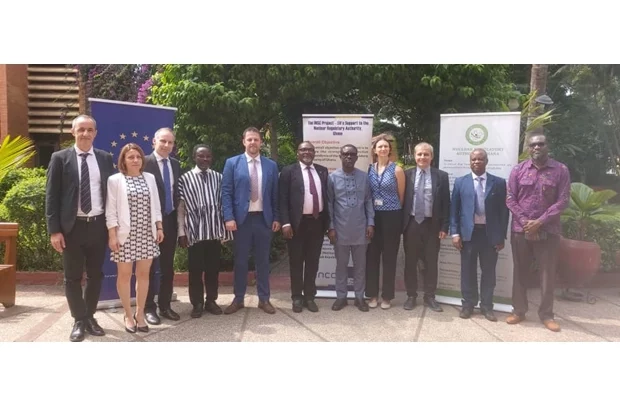EU and NRA officials at the ceremony
The Nuclear Regulatory Authority (NRA) in collaboration with the European Union (EU) has completed its nuclear power programme – the European Instrument for International Nuclear Safety Cooperation (INSC) – to strengthen the country’s nuclear regulatory framework.
The INSC project is to promote nuclear safety, radiation protection and effective safeguards in countries outside the EU in order to safely manage radioactive waste as well as implement nuclear safeguards according to international and EU standards.
Speaking at the closure event, the Deputy Ambassador of the EU to Ghana, Jonas Claes, mentioned that the collaboration shows a shared commitment to safe, responsible and sustainable energy development, stressing that the project will help protect communities, safeguard the environment as well as set a benchmark for the region in nuclear safety.
He commended the country for its active participation in the INSC training and education projects.
He said, “Ghana is one of the most active countries in INSC training and education project, the top class student for the second session of the EU Master’s degree on Leadership for Safety implemented in France came from Ghana NRA.”
Director of Science and Technology at the Ministry of Environment, Science and Technology, Mr. Kwamena Essilfie Quaison, also stated that the project is one of the many benefits the NRA has received through its membership with the Regulatory Cooperation Forum (RCF), adding that the project has provided a vital support for the smooth take off of the authority by supporting in the development of regulatory strategy for nuclear power, integrated management system, human resource development, development of regulations and guidelines, oversight of nuclear power plant siting, transparency and public information.
He stressed that there is the need to set up radiation monitoring system and an emergency response centre to interface with the National Disaster Management Organisation (NADMO)’s emergency command centre.
Mr. Quaison reaffirmed government’s commitment to utilise science and technology for sustainable development.
“Our pursuit of nuclear energy is not merely about power generation, it is about energy security, climate resilience and economic transformation,” he added.
The NRA Project Manager, Prof. Emmanuel Amponsah-Amoako, mentioned that the NRA has benefitted from extensive knowledge transfer, which includes training courses, workshops and on-the-job training with their European counterparts.
NRA is responsible for the regulation of radiation and nuclear facilities to meet national and international standards and obligations in a professional, objective and transparent manner.
By Florence Asamoah Adom


